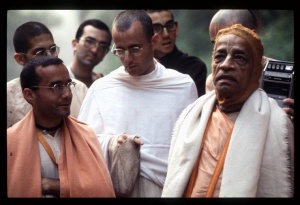CC Madhya 24.259 (1975)

A.C. Bhaktivedanta Swami Prabhupada
Below is the 1996 edition text, ready to be substituted with the 1975 one using the compile form.
TEXT 259
- “ghare giyā brāhmaṇe deha’ yata āche dhana
- eka eka vastra pari’ bāhira hao dui-jana
SYNONYMS
ghare giyā—returning home; brāhmaṇe—to the brāhmaṇas, the most intelligent men in spiritual understanding; deha’—give; yata—whatever; āche—you have; dhana—riches; eka eka—each of you; vastra pari’—just one cloth; bāhira hao—leave home; dui-jana—both of you.
TRANSLATION
“Nārada Muni then advised the hunter, ‘Return home and distribute whatever riches you have to the pure brāhmaṇas who know the Absolute Truth. After you have distributed all your riches to the brāhmaṇas, you and your wife should leave home, each of you taking only one cloth to wear.’
PURPORT
This is the process of renunciation at the stage of vānaprastha. After enjoying householder life for some time, the husband and wife must leave home and distribute their riches to brāhmaṇas and Vaiṣṇavas. One can keep his wife as an assistant in the vānaprastha stage. The idea is that the wife will assist the husband in spiritual advancement. Therefore Nārada Muni advised the hunter to adopt the vānaprastha stage and leave home. It is not that a gṛhastha should live at home until he dies. Vānaprastha is preliminary to sannyāsa. In the Kṛṣṇa consciousness movement there are many young couples engaged in the Lord’s service. Eventually they are supposed to take vānaprastha, and after the vānaprastha stage the husband may take sannyāsa in order to preach. The wife may then remain alone and serve the Deity or engage in other activities within the Kṛṣṇa consciousness movement.